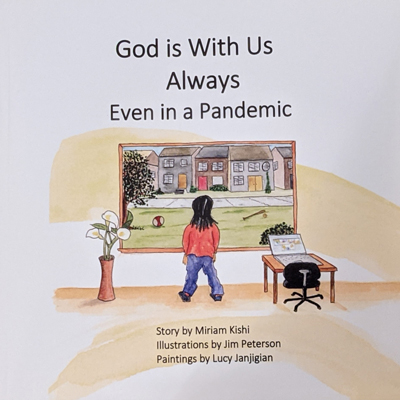The book is for children, youth, and anyone else who may need a reminder of God’s presence and love
July 28, 2021
 Inspired by their grandchildren, three friends and members of Sunnyvale Presbyterian Church in Sunnyvale, California, have created a new children’s book, “God is With Us Always Even in a Pandemic.”
Inspired by their grandchildren, three friends and members of Sunnyvale Presbyterian Church in Sunnyvale, California, have created a new children’s book, “God is With Us Always Even in a Pandemic.”
Since the book’s release in November, retired Christian educator and author Miriam Kishi, illustrator Jim Peterson and painter Lucy Janjigian have joined first- through fifth-grade students from Sunnyvale Presbyterian Church in an online reading. In addition to Peterson’s illustrations and Janjigian’s paintings, the book provides space for children to draw their own pictures of activities missed with friends and new experiences with family, such as sleeping in a tent or making mud pies.
“The children enjoyed talking with Lucy about her paintings and they asked Jim how he made the pictures,” Kishi said. “They talked about how it feels to do school at home, how they miss their friends and about knowing God is with them. We were just blown away. It was such a neat experience.” She said all three are available to host virtual readings and discussions with young people from other churches within the Presbytery of San Jose and throughout the Presbyterian Church (U.S.A.).
A friend of Janjigian also read the book to a group of senior citizens who discussed things they’ve had to give up, such as hugs and in-person visits with family. For both discussion groups thus far, the reminder of God’s loving presence has been reassuring, Kishi said.
Kishi and Janjigian collaborated to create another children’s book about a year and a half ago titled “God Is With Us Always Even in a Tsunami.” Kishi worked as a Christian educator at six churches between 1965 and 2007 and served on the cabinet of the Association of Presbyterian Church Educators (APCE) for four years. Soon after the coronavirus became news in March, Kishi felt led to write a new picture book and reached out to Janjigian and Peterson.
Peterson has trained spiritual directors in three northern California spiritual formation programs for more than two decades. His drawings have been published in several technical books and other training materials, but this is his first children’s book. As a youth he believed the most important question in life is “the question of God.” In work and in life, he has discerned that his only agenda is to assist others in “becoming more aware of God’s presence and responding even more faithfully to God’s love and invitations.”
Janjigian, who was born in Jerusalem from Armenian descent, shares two of her paintings in the book, “World on Edge” and “Passages.” As the daughter of survivors of the Armenian genocide, Janjigian has been a refugee herself and, at age 17, also worked with the United Nations Relief Works & Agency (UNRWA) interviewing Palestinian families in refugee camps. She understands firsthand what is feels like to be displaced from all that is familiar.
Tammy Warren, Communications Associate, Presbyterian Mission Agency
Let us join in prayer for:
PC(USA) Agencies’ Staff
Vaughn Ratliff, Administrative Services Group (A Corp)
Becky Rayner, Administrative Services Group (A Corp)
Let us pray
Father, thanks for the joy of being shared by you, in all our diversity and brokenness, with those you love. Grant us grace to embrace your blessings as we journey with others in this amazing adventure of life. Amen.





